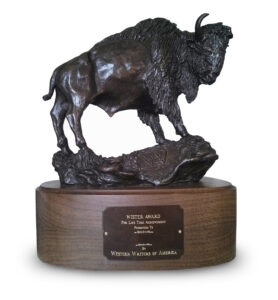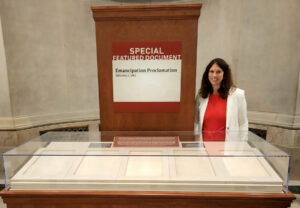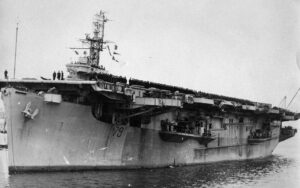A Bohemian Brigade: The Civil War Correspondents, by James M. Perry, John Wiley and Sons, New York, 212-850-6336, 305 pages, $27.95.
I remember watching CBS television’s Dan Rather reporting from Vietnamese battlefields in the 1960s. His left hand held his helmet onto his head while his right kept a death grip on a microphone. Often, hostile rockets thudded into the ground behind him. The crack of rifle fire was usually part of the background noise.
I was young when I saw this, and I was impressed. Mr. Rather seemed to hold forth with a lot of Texas cool, given all that was happening around him. It struck me that being a war correspondent had to be one of the top testosterone-buzz professions on the planet, and I believed I would like to be one.
Years later, I was getting ready to go to journalism school and that same war was less than 48 hours from its conclusion. I recall turning on the television and seeing news correspondent Ed Bradley reporting from the American embassy in Saigon. As he spoke, embassy employees worked behind him shoveling classified documents and millions in U.S. currency into furnaces. His filmed report also showed panicked citizens of Saigon racing around the city on desperate errands. The looks on their faces told you the Four Horsemen of the Apocalypse were riding into town at a quick trot.
Once again, I was impressed. Mr. Bradley was given the dubious privilege of staring into the open maw of Hell and still managed to give a lucid account of the experience. But by this time, I was asking myself why people like Bradley put so much on the line just to bring me a news story. War correspondents were obviously quirky specimens, people who answered to some high-pitched call that most others can’t hear. But were they ambitious beyond reason, obsessed with their profession and all it can demand, or were they danger junkies?
Veteran newsman James M. Perry’s new book A Bohemian Brigade: The Civil War Correspondents looks into the careers of some of the journalists who helped create the news reporting specialty Rather and Bradley once followed, and it’s a history filled with Victorian-era gentlemen, or near-gentlemen, who seem just as driven, ambitious, and addicted to thrills as any of the combat reporters who came after them.
Perry opens his work by recounting the Civil War misadventures of the London Times’ William Howard Russell. The world’s first war correspondent, Russell invented that news genre when he traveled to the Crimea in the mid-1850s to cover Russia’s war with the British and the French, and later to India to cover the Sepoy Rebellion. Russell’s news reports did not stop at monitoring Britain’s military successes and failures. When he wrote about how little care wounded English troops received in the Crimea, or how the Empire’s troops abused captive Sepoy rebels, his stories moved the British public to call for changes in the military.
Perhaps without meaning to, both the reporter and his editors had stumbled onto something powerful. But they were learning war-reporting by trial and error, and there was a great error in their immediate future. In early 1861, when fighting seemed imminent in the United States, the London Times’ editors believed there was no better man than Russell to report the hostilities and interpret the issues for English readers. What they hadn’t thought through was this: it was one thing to report on the work of British troops for British newspaper buyers, but it was something else again to report on a war in which their nation was not involved. On his arrival in North America, Russell, a “celebrity journalist,” was courted by both Union and Confederate politicians, each hoping to sway world opinion to his own cause. Russell saw through this easily, wrote uncomplimentary things about the military prowess of Northern volunteers, reported on his own revulsion at the Southern institution of slavery, and submitted stories that offended both Union and Confederate leaders. He topped this off by doing a poor job of covering the First Battle of Bull Run, outside Washington, D.C., in the summer of 1861.
Perry’s account of how Russell showed up late for the fight because his traveling companion overslept, how he managed to miss and misinterpret important events once he got there, and how his opinionated report of the struggle angered or annoyed most Americans when they finally got their hands on copies of the London Times is an education for any would-be newsman. Dubbed “Bull Run Russell” by cranky Yanks and Rebs, the reporter soon discovered he was persona non grata in both Northern and Southern military camps and capitals and had no choice but to return home.
Savvy, talented American publishers and newsmen tried to learn by Russell’s mistakes. But in Perry’s smoothly written history, readers discover these gentlemen of the American press made their own share of diplomatic and professional blunders, and sometimes suffered from just plain bad luck. Among the unfortunate were New York Tribune correspondents Albert D. Richardson and Junius Henri Brown, seized by Confederates after being shelled out of the water by Vicksburg’s cannons. Captured newsmen were usually repatriated quickly. But Richardson and Browne worked for Horace Greeley, a newspaper publisher despised in the South. Apparently for this reason alone, the pair were refused release and shuttled from one Southern prison to another until they managed to escape from the Confederate lockup in Salisbury, North Carolina. The story of their journey home made for good reading in the war years and is still an entertaining tale in Perry’s book. It’s just one of a large number of anecdotes he includes that show off the Civil War correspondents in all their colors, as everything from armed adventurers to sniveling political lackeys.
Along the way, Perry also addresses the issues that always crop up when a free press in a free society tries to report on its nation’s military figures and military operations. Readers who remember gruff, but amiable General Norman Schwartzkopf and his press conferences during the Persian Gulf War of the early 1990s might also recall that during that operation the world press was fed very little information and that journalists were often forced to rely on “pool reports” of military action (where one escorted reporter gathers news at the front, to later share it with other members of the press corps). This is considered genteel management of the press by Civil War standards. In Perry’s work, he recounts what happened to reporters who angered Union Major General William T. Sherman and Confederate General Braxton Bragg. Each of these prickly officers had a newsman arrested and tried for perceived violations of secrecy laws. Other newsmen were jailed by civil authorities when they were believed to have encouraged defeatism or to have taken some large unpatriotic swipes at their respective governments. Perry also discusses what happened when journalists “went after” a military figure. His account of how reporters savaged Sherman in the early months of the war and heartlessly exaggerated his struggles with severe emotional depression into reports of “insanity” is both accurate and chilling.
With a broad-brush approach, A Bohemian Brigade styles a compact and bright account of the doings and adventures of combat reporters during the Civil War. It also offers up strong, terse biographical sketches of Greeley of the Tribune, New York Times publisher Henry Raymond, and New York Herald chief James Gordon Bennett. Previously, accessible scholarship on these subjects was confined to books such as J. Cutler Andrews’s hefty works The North Reports the Civil War and The South Reports the Civil War, articles in scholarly journals, and bombastic or self-congratulatory autobiographies written by the 19th-century newsmen themselves. Perry’s new title easily melds many of the style differences between some of these earlier books and gives readers with a passing knowledge of Civil War history something different to enjoy. But his concise preface also made a strong point with me. It notes that Horace Greeley was once as well known to Civil War-era Americans as CBS TV’s Dan Rather is to modern news consumers: in the world they inhabited, he was a trusted source of information. I will agree with that. But I’m certain old Greeley never inspired a young person to take up combat reporting. If anybody inspired that next generation of war correspondents, it had to be someone cool under fire. Maybe it was Richardson or Browne.
John E. Stanchak
Harrisburg, Pennsylvania




